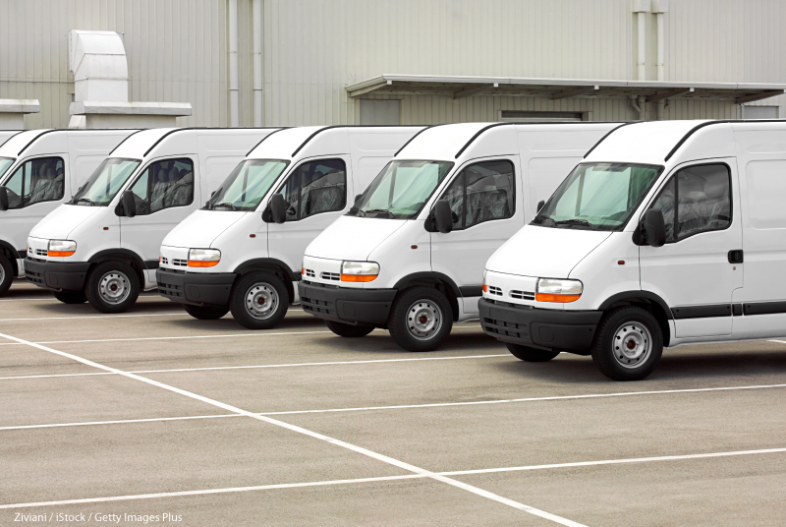While a business credit card can help you get rewarded for general business expenses, a fleet card allows your drivers to buy gas and possibly pay for car repairs. Fleet cards offer special benefits for businesses that require a steady flow of fuel to keep company vehicles on the road.
“Fleet cards can help business owners manage their gas-related purchases and receive discounts on gas at the gas station,” says Jordan Tarver, Credit Analyst at FitSmallBusiness.com.
Advantages of fleet cards
Fleet cards offer some benefits that business credit cards do not. For example, fleet fuel cards allow you to:
Track fuel purchases in detail
Fleet cards provide detailed information about each fuel purchase, including the number of gallons purchased, vehicle odometer reading, date and time, total cost, and the name of the driver who filled the tank.
“This information is available almost in real time or within hours,” says Tom Coffey, senior vice president of sales for Merchants Fleet, a national fleet management company that offers fleet fuel cards.
Most companies offer a web portal where you can check your details. You should also be able to set up text or email notifications to receive purchase notifications based on the criteria you set.
Stop fraud with tighter controls
A fleet card can be useful if you want to issue cards to drivers but are worried about unauthorized purchases at service stations, such as stocking up on snacks or pumping out excess gas for your home lawn mower.
Fleet fuel cards provide security and control at the point of sale so a business owner can pre-determine which payments will be allowed, says Paul Clinton, senior web editor for Automotive Fleet Magazine. For example, a business owner can set up a card to only allow gas purchases, and only from 9:00 am to 5:00 pm.
“Originally it was called Twinkie’s defense, so [fleet owners] can prevent employees from buying food or charging fuel after hours,” Clinton says.
Monitor the fuel efficiency of your fleet
Another benefit of detailed tracking is that you can find out if your vehicles are running at peak fuel efficiency. Because you get an odometer reading every time you fill up the tank, Coffey says, you can know how many miles per gallon each vehicle is driving. And poor gas mileage can tell you when you need to pump up your tires or slow down when you’re driving badly.
Get rewarded for buying a lot of gas
Do you buy over 1,000 gallons of gasoline or diesel each month? A fleet card that offers bulk discounts on fuel can help you save money for your business. Discounts vary, but fleet cards typically offer a discount of one to five cents per gallon. Some cards offer tiered programs, meaning the more fuel you buy each month, the more you save.
Cons of fleet cards
However, transport cards have some drawbacks, so they cannot completely replace small business cards. The disadvantages of fleet cards include:
Purchases must be related to the vehicle
Fleet cards allow you to buy fuel at service stations, and some also allow you to pay for other vehicle-related expenses, such as maintenance at auto repair shops. But in order to make general business purchases, from conference travel to printer paper and coffee that fuels your employees, you’ll also need a small business credit card.
Vendor choice may be limited
Depending on the fleet map, you may also be limited in which merchants you can use. For example, you may be limited to a particular chain of gas stations or shopping in a particular geographic area.
May require frequent payment
Do you pay card balance once a month or more often? For example,
Some issuers require you to pay your bill once a week or every two weeks, Coffey said. It is important to know in advance what the payment terms are, in case paying the balance more than once a month is not possible.
Fees may add up
Different fleet cards have different fee structures, so it’s important to know the interest rate and any fees. Some cards don’t charge a monthly fee, while others waive it if you buy a certain amount of gas per month. However, some cards charge a flat monthly fee, such as $10, or a $2 or $3 per month fee for a card that can stack up if you have multiple drivers. Given potentially frequent payment terms, late fees can also become a problem if you miss a payment from time to time.
When does a fleet card make sense?
Fleet fuel cards can be a great tool to help business owners save on gas, manage employee purchases, and keep track of vehicle fuel and maintenance. Companies with two or more vehicles that buy at least 1,000 gallons of gasoline a month may want to consider using a fleet card, Tarver said.
But they’re not right for every business, says Christopher Carillo, co-founder of Allied Payments, which offers credit card processing services for merchants. According to Carillo, “For smaller fleets, it might be better to get a cash-back credit card with no annual fee and just trust your employees to use it to pay for gas.”
Not sure if you should get a small business credit card or a fleet card? You probably need both. Even if you earn enough miles on your company’s vehicles to use the fleet card, since you’ll be limited to vehicle-related purchases, you’d be better off having a business card as well.
bottom line
If transportation is an important part of your business and you drive many miles on different wheels, then it makes sense to get a fleet card. You’ll get access to valuable stats from your vehicles, be able to set limits on what drivers can buy (and when), and maybe even unlock generous gas rewards to boost your profits. But be mindful of limitations when it comes to merchants, types of purchases, different commission structures, and payment terms.
Editorial disclaimer
The editorial content on this page is based solely on the objective judgment of our contributors and is not based on advertising. It was not provided or ordered by credit card issuers. However, we may receive compensation when you click on links to our partners’ products.


